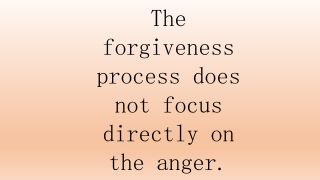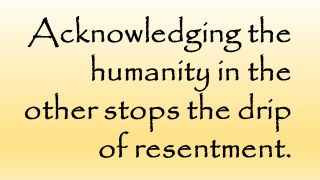Forgiveness
How Does Forgiving Cure One's Resentment?
The way forgiveness cures resentment is different from traditional therapy.
Updated June 22, 2023 Reviewed by Michelle Quirk
Key points
- Traditional therapy tends to focus on current symptoms. If a person has anxiety, the focus is on this emotion.
- Forgiveness therapy does not focus directly on the symptoms, but at first uncovers them.
- This focus on forgiving the one who acted unjustly makes a large difference in healing the resentment.

I was challenged recently with a new criticism concerning the process of forgiveness. The criticism went something like this: In the process of forgiveness, the emphasis at first is to scrutinize one's level of deep and ongoing anger or what psychologists call resentment, level of fatigue, and level of pessimism that may have developed in the forgiver's heart. Yet, in these exercises, there are no techniques for actually and directly reducing resentment, boosting one's energy, and banishing pessimism. Therefore, the critic was disappointed because there was no direct advice for being cleansed of these three troubling symptoms.
Not a Technique for Directly Addressing Resentment
While the critic is correct that the forgiveness process does not provide specific techniques for curing these three troubling symptoms, he misses the point of what is involved in forgiving. Forgiveness is not technique-oriented. In other words, the point is not, for example, to focus on anger and address it with new thoughts about that anger. There is not a technique of relaxation when feeling resentful so that the deep anger is not so present when relaxed. Relaxation is great when people are relaxing, but when they arise from the couch and continue to live life in a regular way, then the tensions can once again mount and the disrupting anger can return.
What the critic missed was this: The anger, the fatigue, and the pessimism slowly begin to diminish when the forgiver actually does not focus on these issues. Instead, each one can be cured when the forgiver focuses away from these symptoms and focuses now on the person who acted unjustly, who may be responsible in a large way for the anger, fatigue, and pessimism.
Shining the Light Away From Resentment and Onto the Offending Person
The point of forgiveness is to shine the light away from the self and toward the one who caused the harm. This may seem odd or even inappropriate, but here is where this focus becomes curative: When others abuse a person, this person's heart can become dominated by persistent and deep anger. That resentment is like a steady drip of water onto a stone. If that water continues for years, what happens to that stone? It starts to degenerate. It starts to decompose.
It is similar with the human heart. As other people treat the person in a disrespectful or cruel way, the anger enters into the unjustly treated person's heart. That anger, drip by drip, falls onto the heart, hurting the heart, disrupting the person, and causing fatigue and negative thoughts. Notice importantly that it is not the original injustice that now is causing the damage. Instead, it is the effects of that injustice, the deep and abiding anger that enters the heart and does not leave. It keeps falling onto the heart, day by day, week by week, month by month, and year by year. This corrosive activity of resentment on the heart can disrupt the psychological and physical well-being of the one who received, and did not deserve, the mistreatment.

How Forgiveness Works to Reduce Resentment
The healing in the heart starts not with a focus on the anger, but instead on expanding one's story of who the offending person is. As the forgiver begins to see, even in a very small way, that the one who acted badly is far more than just those injustices against the forgiver, the drip, drip, drip of the anger toward the other begins to slow down in the heart. As the forgiver starts to see the other person as a genuine person, more valuable than the negative behaviors, this again slows the drip of anger. As the forgiver stands in the pain of what happened so that the resentment deliberately does not pour back to the misbehaving other person, or to unsuspecting innocent others, that abiding anger slows even more. When the forgiver then decides to engage positively, even in a small way, toward the one who acted badly, this goes a long way toward shutting off the drip-spout of anger onto the heart.
Over time, with these positive developments toward the offending person, without being pressured to do so, the forgiver, without ever focusing directly on their own unpleasant symptoms, is healed. As the deep anger diminishes, the burden of fatigue lessens. As the deep anger diminishes, the heart once again can react more positively toward other people and to life in general, moving from a pessimistic philosophy of life to a more optimistic outlook. After all, the forgiver now realizes that others' unfairness never will crush the self ever again because there is a cure for the dripping of incessant anger that too often can visit hearts unprepared for the injustices and unprepared to forgive.
The Paradox of Forgiveness
We come full circle back to the original criticism. The critic wanted quick techniques, early in forgiveness therapy, to confront and heal from the uncovered challenging anger. The critic did not make the connection between uncovering anger and then starting the journey of forgiveness as a way of curing the inner discontent. Traditional psychotherapies so often focus on symptoms. Do you have deep anger? Then, once we uncover the anger, we will address that anger directly with anger-reduction techniques.
In contrast, forgiveness therapy, once it uncovers the anger, shifts the focus toward the offending person—not on the anger itself—and this paradox makes all the difference for the human heart and the anger faucet that has been steadily on, perhaps for years. It is forgiveness that can shut off that faucet, perhaps more deeply than those traditional therapies that insist that the way of shutting off the anger faucet is to go to that faucet and try to shut it off. Unfortunately, a focus on the anger faucet as an end in and of itself can keep the faucet going without the healing from trauma that forgiveness can bring. The paradox of forgiveness therapy is this: As the forgiver sets aside the quest to turn off the anger faucet and begins to see the offending person as a true person who is special, unique, and irreplaceable (as all people are), it is here that the dripping of the anger faucet turns off.


